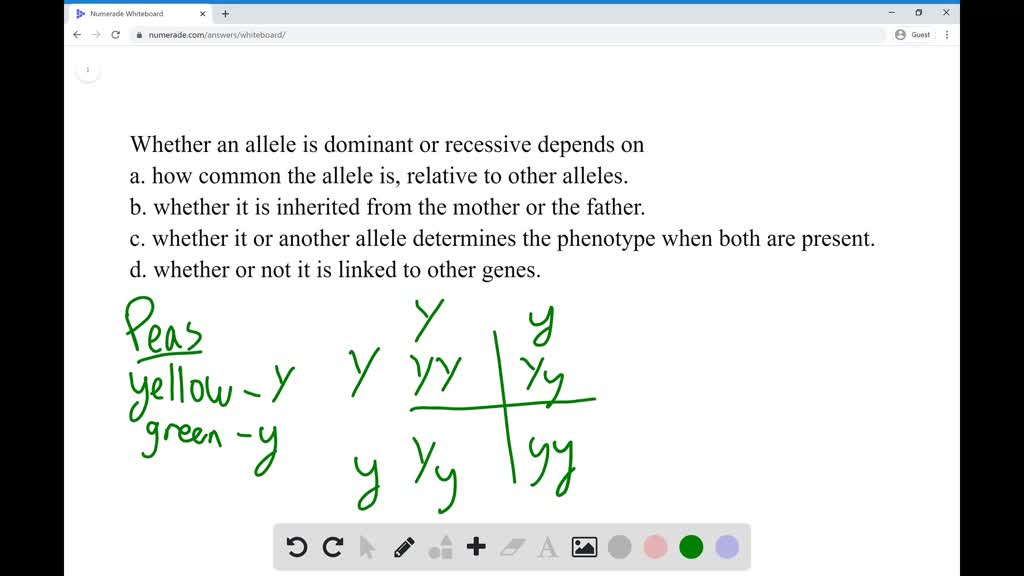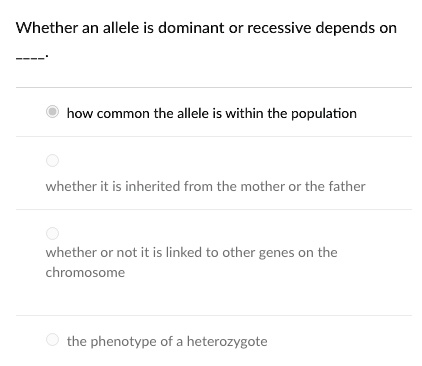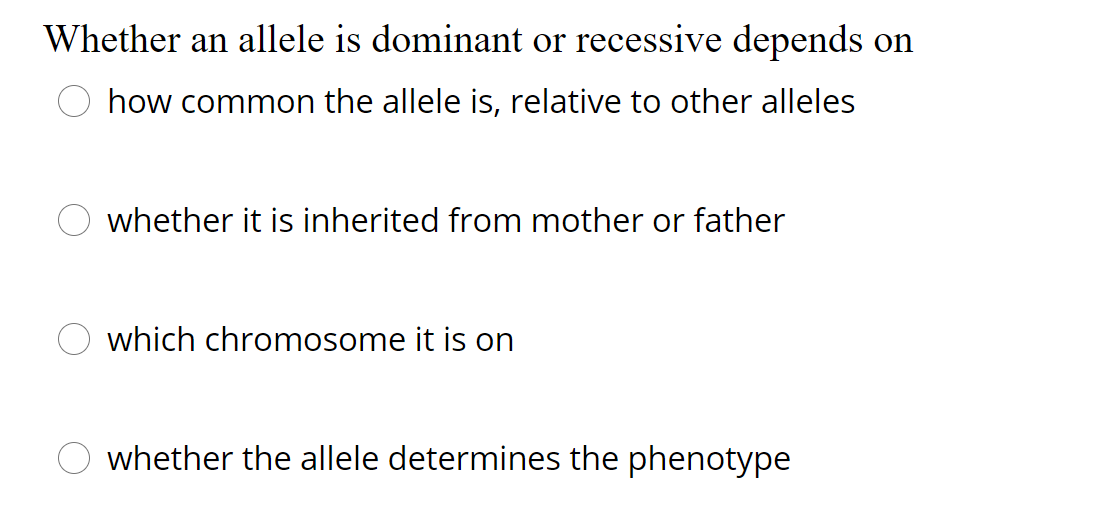Whether an Allele Is Dominant or Recessive Depends on
Here the functional allele is Haplosufficient able to produce enough protein in heterozygous condition and is called the dominant since it expresses its phenotype both in heterozygous and homozygous conditions. Whether it or another allele determines the phenotype when both are present.

Solved Whether An Allele Is Dominant Or Recessive Depends On A How Common The Allele Is Relative To Other Alleles B Whether It Is Inherited From The Mother Or The Father C Whether
Whether it or another allele determines the phenotype when both are present.

. Whether or not it is linked to other genes. Part of the reason no one talks about this is that theres no one-size-fits-all answer. The dominance of different alleles of a gene is largely determined by the nature of the protein that it encodes.
How common the allele is relative to other alleles. In terms of blond and dark hair color if we can just for now pretend that it is determined by one gene it is caused by a gene that directs the synthesis of. Whether it or another allele determines the phenotype when both are present.
Whether or not it is linked to other genes. Whether an allele is dominant or recessive depends on a. Different alleles can be dominant or recessive for different reasons.
Dominant and Recessive Alleles. That individuals blood will have the antigens of both type-A and type-B blood. A dominant allele is one that is expressed to a greater degree than the other allele that is present.
Whether it or another allele determines the phenotype when both are present. So the complete absence of a product from a gene can lead to a recessive allele or an incompletely dominant one. For example cystic fibrosis is caused by a mutation in an ion channel called the cystic fibrosis transmembrane conductance regulator CFTR that prevents the ion channel for working properly.
How common the allele is relative to other alleles. Whether an allele is dominant or recessive depends on whether it is inherited from the mother or the father. Whether it is inherited from the mother or father.
How common the allele is relative to other alleles. An individual with one dominant and one recessive allele for a gene will have the dominant phenotype. If you have one dominant allele and one recessive allele your phenotype will appear from the dominant allele.
Whether an allele is dominant or recessive depends on a how common the allele is relative to other alleles b whether is is inherited form the mother or the father c whether it or another allele determines the phenotype when both are present d whether or not it is linked to other genes. The proteins they code for Remember lesson 12 on Natural Selection and Diseases. The terms can also be subjective which adds to the confusion.
This means that if a person receives the allele for type-A blood from one parent and type-B blood from the other he will have blood type AB. This is pretty common. The answer depends on whether one allele is dominant over the other.
Whether an allele is dominant or recessive depends on the particulars of the proteins they code for. The Same Allele can be Dominant Recessive or Co-dominant. The same allele can be considered dominant or recessive depending on how you look at it.
Here again one allele codes for a functional protein while the other does not. Mar 4 2018 Your phenotype depends on the dominant allele. How common the allele is relative to other alleles.
SOLVEDWhether an allele is dominant or recessive depends on a. 1 Answer Nam D. How common the allele is relative to other alleles.
Whether it or another allele is expressed when they are both present. Whether or not it is linked to other genes. If a person carries a heterozygous set of alleles both uppercase and lower case letter of the gene then the person will show the dominant trait being that there is an uppercase letter present.
Dominant alleles do not physically dominate or repress recessive alleles. Whether an allele is dominant or recessive depends on a. Whether or not it.
Whether an allele is dominant or recessive depends on the exact biochemical mechanisms at work. Whether an allele is dominant or recessive depends on the particulars of. For example defects in structural proteins generally manifest as dominant traits because being heterozygous results in defective protein.
T - dominant and small t. The allele for blood type-A and blood type-B can be co-dominant with each other. Whether it is inherited from the mother or the father.
No because the phenotypic ratio depends on the allele frequency is of a dominant and recessive alleles. It all depends on the gene. Whether it is inherited from the mother or the father.
Whether an allele is dominant or recessive depends on Allele is the alternate form a gene and each gene has two allele Tt. For example one possible scenario for. As you said we always hear about certain alleles being dominant or recessive.
Whether an allele is dominant or recessive depends on. Whether it is inherited from the mother or the father. With a broad stroke a dominant allele is a gene that does something and a recessive allele is a gene that does not.
Whether an allele is dominant or recessive depends on the particulars of the proteins they code for. Many times a broken version of a gene is recessive. How common the allele is relative to other alleles.
The reason the combination of genes leads to a certain trait does not affect what we call the trait. Which chromosome it is on. For example the brown eye allele is dominant B.
But no one ever says what causes an allele to be dominant or recessive. With that being said there are 2 sets of alleles that can be dominant or recessive. And a functional protein can sometimes be recessive.
However type-O blood is recessive to both. The number of phenotypes produced for a given trait depends on how many genes control trait. Can you determine whether an allele is dominant or recessive on the basis of the ratio of phenotypes in the population.
Dominant alleles do not physically dominate or repress recessive alleles. Whether an allele is dominant or recessive depends on how common the allele is relativve to other alleles whether it is inherited from mother or father which chromosome it is on whether the allele determines the phenotype Answer Whether an allele is dominant or recessive depends on a.

Solved Whether An Allele Is Dominant Or Recessive Depends On How Common The Allele Is Within The Population Whether It Is Inherited From The Mother Or The Father Whether Or Not It Is

Whether An Allele Is Dominant Or Recessive Depends On Youtube

Solved Whether An Allele Is Dominant Or Recessive Depends On Chegg Com
No comments for "Whether an Allele Is Dominant or Recessive Depends on"
Post a Comment